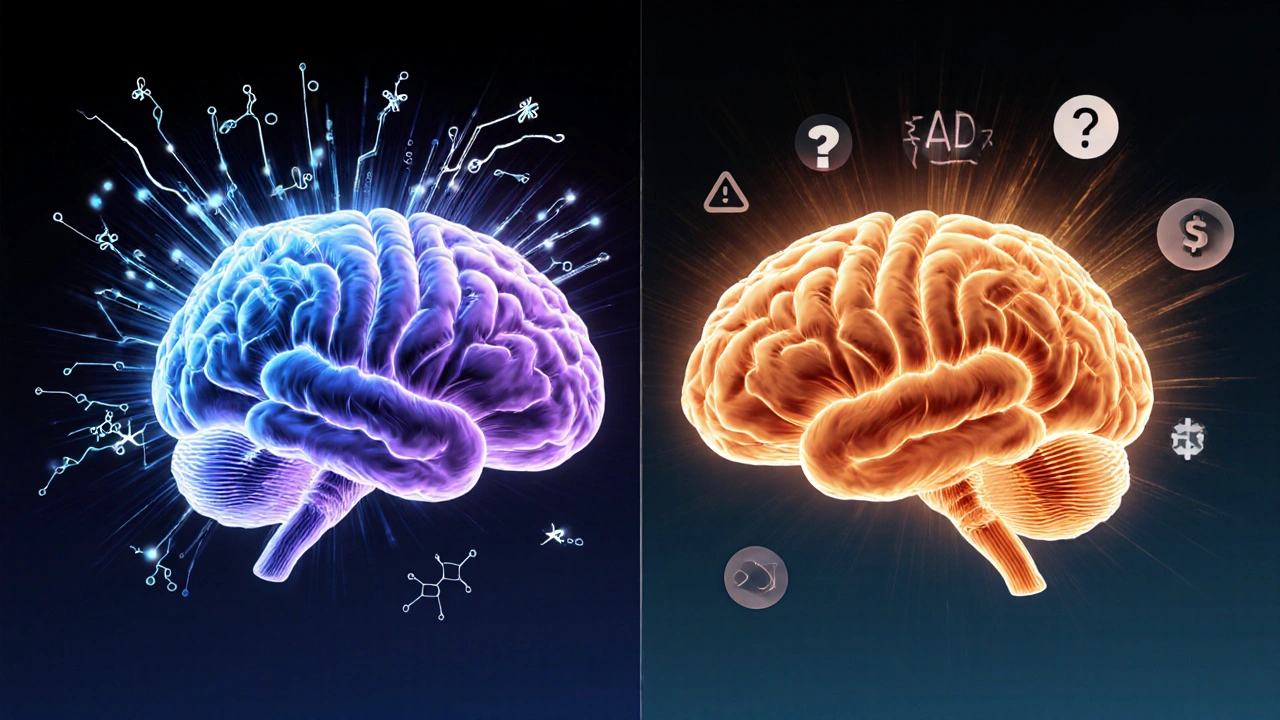Antipsychotic Comparison Tool
This tool helps compare Abilify (Aripiprazole) with other oral antipsychotics based on key attributes.
TL;DR
- Abilify (aripiprazole) is a partial‑dopamine agonist used for schizophrenia, bipolar I, and as an adjunct in depression.
- It causes fewer metabolic side‑effects than olanzapine or clozapine but may trigger akathisia.
- Key oral alternatives include risperidone, quetiapine, olanzapine, ziprasidone, and lurasidone.
- Cost varies widely; brand Abilify can be 3‑5× more expensive than generic aripiprazole.
- Choosing the right drug hinges on symptom profile, side‑effect tolerance, and insurance coverage.
What is Abilify (Aripiprazole)?
When treating serious mental health conditions, Abilify is a second‑generation antipsychotic whose generic name is aripiprazole. It works as a dopamine‑system stabilizer, meaning it can both dampen excess dopamine activity and boost it when levels are too low. FDA‑approved uses include schizophrenia, bipolar I disorder (mania), and as an add‑on for major depressive disorder.
How Does Abilify Differ Mechanistically?
Most atypical antipsychotics block dopamine D2 receptors outright. Abilify, however, is a partial agonist at D2 and D3 receptors and a serotonin 5‑HT1A partial agonist while antagonising 5‑HT2A. This unique profile gives it a lower incidence of prolactin elevation and metabolic disturbances compared with many peers.
Key Benefits of Abilify
- Reduced risk of weight gain and diabetes relative to olanzapine or clozapine.
- Lower prolactin‑related side effects (e.g., menstrual irregularities, gynecomastia).
- Once‑daily dosing for most formulations, improving adherence.
- Broad FDA‑approved indications, so clinicians can stay on one medication across multiple diagnoses.
Common Side Effects to Watch
While the metabolic profile is favorable, Abilify has its own set of concerns:
- Akathisia (inner restlessness) - reported in up to 25% of patients.
- Insomnia or somnolence, depending on dose timing.
- Gastrointestinal upset (nausea, constipation).
- Rarely, impulse‑control problems such as pathological gambling.
Cost Landscape
Brand‑name Abilify can cost $1,200-$1,800 per month without insurance. The generic aripiprazole drops that to $150-$300 per month, but price varies by pharmacy and dosage. Many insurance plans place Abilify on a higher tier, requiring prior authorization.

Top Oral Alternatives: Quick Comparison
| Medication | Mechanism | FDA‑approved Uses | Weight‑gain Risk | Typical Starting Dose | Generic Availability |
|---|---|---|---|---|---|
| Abilify | Partial D2/D3 agonist | Schizophrenia, Bipolar I, Adjunct Depression | Low | 2mg daily | Yes (aripiprazole) |
| Risperidone | D2/5‑HT2A antagonist | Schizophrenia, Bipolar, Irritability in ASD | Moderate | 1mg daily | Yes |
| Quetiapine | D2/5‑HT2A antagonist (low affinity) | Schizophrenia, Bipolar, Major Depression (adjunct) | High (sedation, weight) | 25mg daily (titrated) | Yes |
| Olanzapine | D2/5‑HT2A antagonist | Schizophrenia, Bipolar I | Very high | 5mg daily | Yes |
| Ziprasidone | D2/5‑HT2A antagonist + serotonin reuptake inhibition | Schizophrenia, Bipolar I | Low to moderate | 20mg daily (with food) | Yes |
| Lurasidone | D2/5‑HT2A antagonist + 5‑HT7 antagonism | Schizophrenia, Bipolar Depression | Low | 20mg daily (with food) | Yes |
When to Choose Abilify Over Alternatives
Consider Abilify if you:
- Need a medication that’s less likely to cause significant weight gain.
- Have a history of prolactin‑related side effects on other antipsychotics.
- Prefer a single pill that can treat both schizophrenia and bipolar mania.
- Require a drug with a relatively quick titration schedule (2mg increments).
If akathisia is especially problematic, a switch to a more sedating agent like quetiapine or olanzapine might be better. Conversely, for patients who experienced troublesome sedation on quetiapine, Abilify’s activating profile can be a relief.
Decision Checklist for Clinicians & Patients
- Identify primary diagnosis (schizophrenia, bipolar I, adjunct depression).
- Assess metabolic risk factors (BMI, fasting glucose, lipid profile).
- Review prior antipsychotic tolerability (weight gain, prolactin, EPS).
- Check insurance formulary - prioritize generic aripiprazole if cost is a barrier.
- Start at the lowest effective dose; monitor for akathisia during the first 2‑4 weeks.
- Re‑evaluate every 8 weeks: symptom control, side‑effect burden, lab values.
Special Populations
For adolescents (13-17years) and older adults, dose adjustments are key. The FDA approves a 5mg starting dose for adolescents with schizophrenia, while older adults may benefit from a 2mg start to minimize restlessness.
Pregnancy data are limited, but registry reports suggest no major teratogenic signal. Nonetheless, clinicians usually opt for the lowest effective dose and weigh fetal risk vs. maternal relapse.
Potential Drug Interactions
Abilify is metabolized primarily by CYP2D6 and CYP3A4. Strong CYP2D6 inhibitors (e.g., fluoxetine, paroxetine) can raise aripiprazole levels by up to 80%, necessitating dose reductions. Conversely, inducers like carbamazepine can lower concentrations, risking loss of efficacy.
Bottom Line
If metabolic health and prolactin issues are top concerns, Abilify often wins the trade‑off table. However, every patient’s symptom profile and insurance situation differ, so a side‑by‑side look at the alternatives in the table above helps make a personalized choice.
Frequently Asked Questions
Can I switch from Abilify to another antipsychotic without a washout period?
Usually you can cross‑taper over 1-2 weeks. Overlap helps prevent relapse, but the exact schedule depends on the new drug’s half‑life and the patient’s side‑effect profile.
Is generic aripiprazole as effective as brand‑name Abilify?
Yes. Bioequivalence studies show the generic meets the same FDA standards for absorption and efficacy. The main difference lies in cost.
What should I do if I develop akathisia on Abilify?
First, tell your prescriber. Strategies include dose reduction, adding a low‑dose beta‑blocker (e.g., propranolol), or switching to a less activating antipsychotic.
How long does it take for Abilify to show clinical improvement?
Acute psychotic symptoms often improve within 1-2 weeks, but full stabilization can take 4-6 weeks. Patience and regular follow‑up are crucial.
Is Abilify safe for patients with heart rhythm issues?
Abilify can cause QT‑interval prolongation at high doses, especially with ziprasidone or other QT‑prolonging drugs. Baseline ECG and careful dose monitoring are recommended for high‑risk patients.
